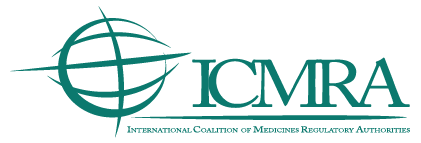ICMRA-ICH-IPRP-PICS Joint Work Plan for Harmonisation and Convergence Work to Advance Development of a Regulatory Pharmaceutical Quality Knowledge Management Capability
Version1: September 2023
Introduction
The International Coalition of Medicines Regulatory Authorities (ICMRA), International Council for Harmonisation of Technical Requirements for Pharmaceuticals for Human Use (ICH), International Pharmaceutical Regulators Programme (IPRP), and Pharmaceutical Inspection Co-operation Scheme (PIC/S) are aligning efforts to build the data infrastructure to support a global regulatory Pharmaceutical Quality Knowledge Management (PQKM) capability to ultimately enable better availability of high-quality medicines. The shared vision of the four organisations for the development of this global capability was outlined in a Joint Reflection Paper published in July 2022. The paper outlined the coordinated, multi-stakeholder approach to harmonisation work required to support the development of a regulatory PQKM capability. It is envisaged that such work can strengthen international collaboration to support global development, manufacture, and supply, ultimately resulting in timely access to safe, effective, high-quality medicines, and thereby assuring public health.
Working collaboratively, ICMRA, ICH, IPRP and PIC/S identified areas of regulatory harmonisation or convergence-related work that each organisation intends to undertake to support the development of a PQKM capability, to be coordinated through the ICMRA PQKM Joint Reflection Paper (JRP) Sub-Working Group. The focus areas identified are as follows:
- ICH proposed to undertake work primarily focused on further specification or clarification of harmonised requirements for the quality sections of the electronic common technical document (CTD) and the data elements and data standards related to those CTD module 2 and 3 submissions.
- IPRP proposed to undertake work on convergence of regulatory expectations among regulators regarding quality assessments for new applications and in relation to post-approval changes (PACs), taking into consideration available harmonised technical guidelines.
- PIC/S proposed to carry out work focused revisions to the PIC/S inspection report template to enable a structured data format to facilitate electronic data exchange, and continued work to develop tools and templates for pharmaceutical quality system (PQS) assessment for inspectors and work on related inspector training modules.
- Additionally, it was proposed that as part of the overall ICMRA PQKM project, the PQKM WG would progress work to:
- Assess the need for internationally harmonised unique identifiers to enable the envisioned PQKM capabilities supporting regulatory collaboration and reliance, and
- Explore approaches to establishment and governance of a secure standardized technology platform for PQKM.
Within the joint reflection paper, ICMRA, ICH, IPRP and PIC/S committed to developing a multi-year work plan. The work plan, presented below, identifies the specific harmonisation or convergence topics/projects that the four organisations will undertake in a coordinated and prioritised manner, focussing on work to be initiated in the period 2023 to 2027.
Joint work plan
Identified areas of harmonisation work
The following section provides an overview of the harmonisation work to be undertaken by each of the four organisations that will contribute to the development of a PQKM capability.
ICH – Data elements and standards
- M4Q(R2): Common Technical Document and Quality Guidance
The M4Q(R2) Expert Working Group (EWG) will focus on the revision of Common Technical Document (CTD) quality sections in modules 2 and 3 to capture quality information for the registration and lifecycle management of pharmaceuticals for human use.
- New Guideline on Structured Product Quality Submissions
This project will seek to identify existing common quality information within electronic Common Technical Document (eCTD) module 3 for which structured information standardisation will benefit business processes or public health and the development, where appropriate, of structured data models, including elements, vocabulary, and ontologies for quality information (the content standard).
IPRP – Alignment of regulatory assessment and expectations
- Survey of IPRP members and observers and analysis of the implementation of the IPRP Quality Assessment Tools
A suite of four Quality Assessment tools were developed to share best practices and promote convergence of expectations and procedures for the assessment of quality information in registration applications and active substance master files / drug master files. The work could facilitate information and work sharing among regulators.
A survey on the status of the implementation of some of these Quality Assessment tools was conducted in 2020. Since that time, there have been several developments within the work of the IPRP Quality Working Group (QWG) (e.g., documents reaching finalisation, additional members joining the QWG, further progress on implementation by some of the regulators). An updated survey is intended to obtain recent information on the statuses of the implementation of these four documents and any recommendations for enhancements to these documents that may further support the objectives of the QWG.
- Survey of Industry and IPRP members and observers for analysis of similarities and differences and for identification of potential opportunities for convergence for quality post-approval changes and variations
This project aims to identify potential areas to promote convergence of regulatory expectations among participating regulators regarding quality post-approval changes (PACs)/variations, by analysing the current situation, with a goal of enhancing predictability and transparency, facilitating convergence, enabling collaborative assessment, and ultimately promoting more reliance on assessment of PACs/variations.
- Survey of IPRP members and observers and analysis of the implementation of ICH Q12
The purpose of this survey is to understand and analyse the status and challenges regarding the implementation of the ICH Q12 guideline for the IPRP members and observers, focusing mainly on the following essential items:
a. Categorisation of quality PACs
b. Post-Approval Change Management Protocol (PACMP)
c. Established Conditions (ECs).
PIC/S – Inspections
- Propose revisions to the PIC/S inspection report template
A PIC/S Working Group will review and propose revisions to the PIC/S inspection report template to enable a structured data format to facilitate electronic data exchange.
- Develop tools and templates for PQS assessment for inspectors and associated training
PIC/S will continue its work to develop tools and templates for PQS assessment for inspectors and work on related inspector training modules in the PIC/S Inspectorates’ Academy (PIA). This is an ongoing activity that is subject to routine work of PIC/S and review under annual and multiyear work plans, which are subject to change.
- Promotion of use and reliance on good manufacturing practice inspectional information
PIC/S will continue its work on promoting use and reliance on good manufacturing practice (GMP) inspectional information. This is an ongoing activity that is subject to routine work of PIC/S and review under annual work plans.
ICMRA PQKM WG - Cross-organisational collaboration – Unique identifiers
Assessing need for internationally harmonized unique identifiers to enable PQ KM capability
The ICMRA PQKM Working Group established a sub-working group to assess and confirm the minimum requirements for identification of products, facilities, marketing applications, marketing application holders, and any other key information components needed to conduct regulatory inspections or assessments related to pharmaceutical quality oversight—that would be needed to support the envisioned PQKM capability. To fortify this joint effort under ICMRA, the PIC/S Working Group on Unique Facility Identifiers has been provided with a wider mandate to engage with IPRP, ICH and ICMRA to share recommended approaches in application of geo-coordinates and collaborate in adoption of a common approach to unique facility identifiers. The assessments and recommendations from this sub-working group including regulatory authorities will be further advanced through subsequent engagement with industry and other external expert stakeholders to consider existing global standards and assess the degree to which these can meet the PQKM needs.
ICMRA PQKM WG - Cross-organisational collaboration – Secure Standardized Technology Platform
Exploring approaches to establishment and governance of a secure standardized technology platform for PQKM.
The PQKM Working Group additionally established a sub-working group to address approaches for building a PQKM technology solution. This group has engaged in initial exploration of the issues and approach(es) for establishing and supporting a technology platform solution to support PQKM including considerations related to technical capability, data and system security, governance, and financing. Their general approach has been to identify key questions related to these considerations and develop a reflection paper to propose an approach to further address the identified issues and include engagement of industry stakeholders in that further work.
Key actions and estimated timelines
Further details on the key actions to be completed in the context of the above-mentioned projects are presented below in Table 1. It is important to note that the estimated timelines and expected completion dates are subject to change. ICMRA, ICH, IPRP and, PIC/S will routinely review the progress and status of the projects and actions listed in the work plan and will update this document accordingly.
Table 1 - Key actions and estimated timelines of identified areas of harmonisation work
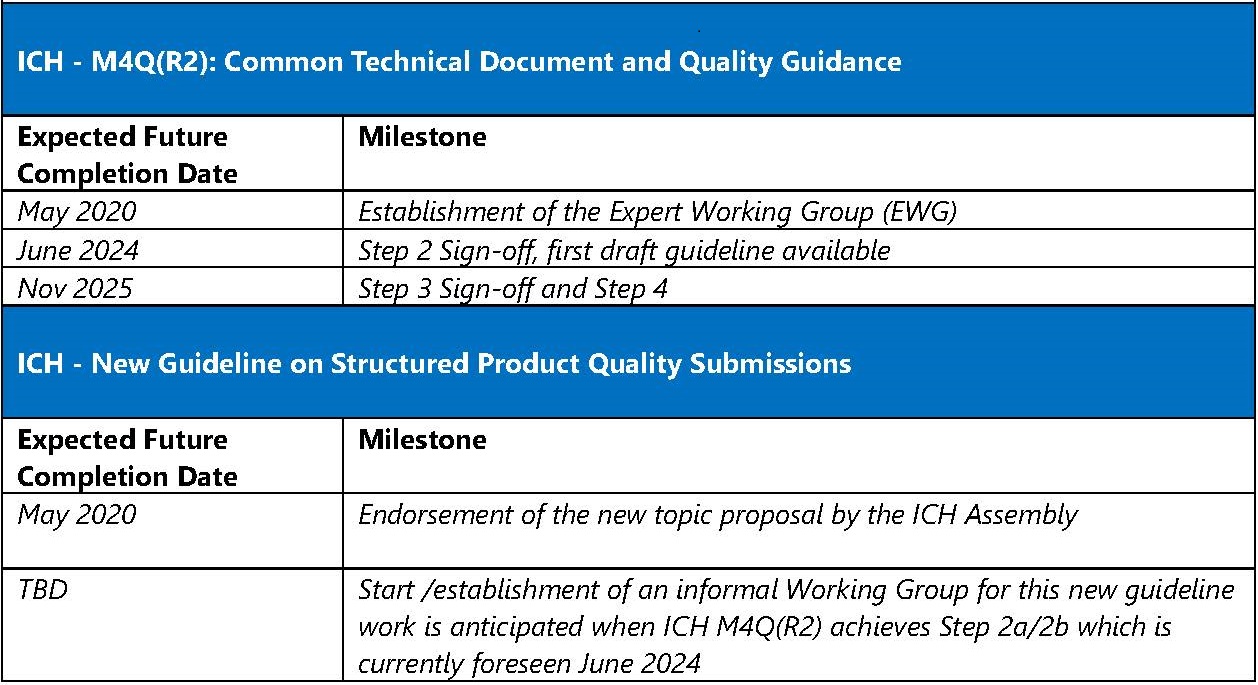
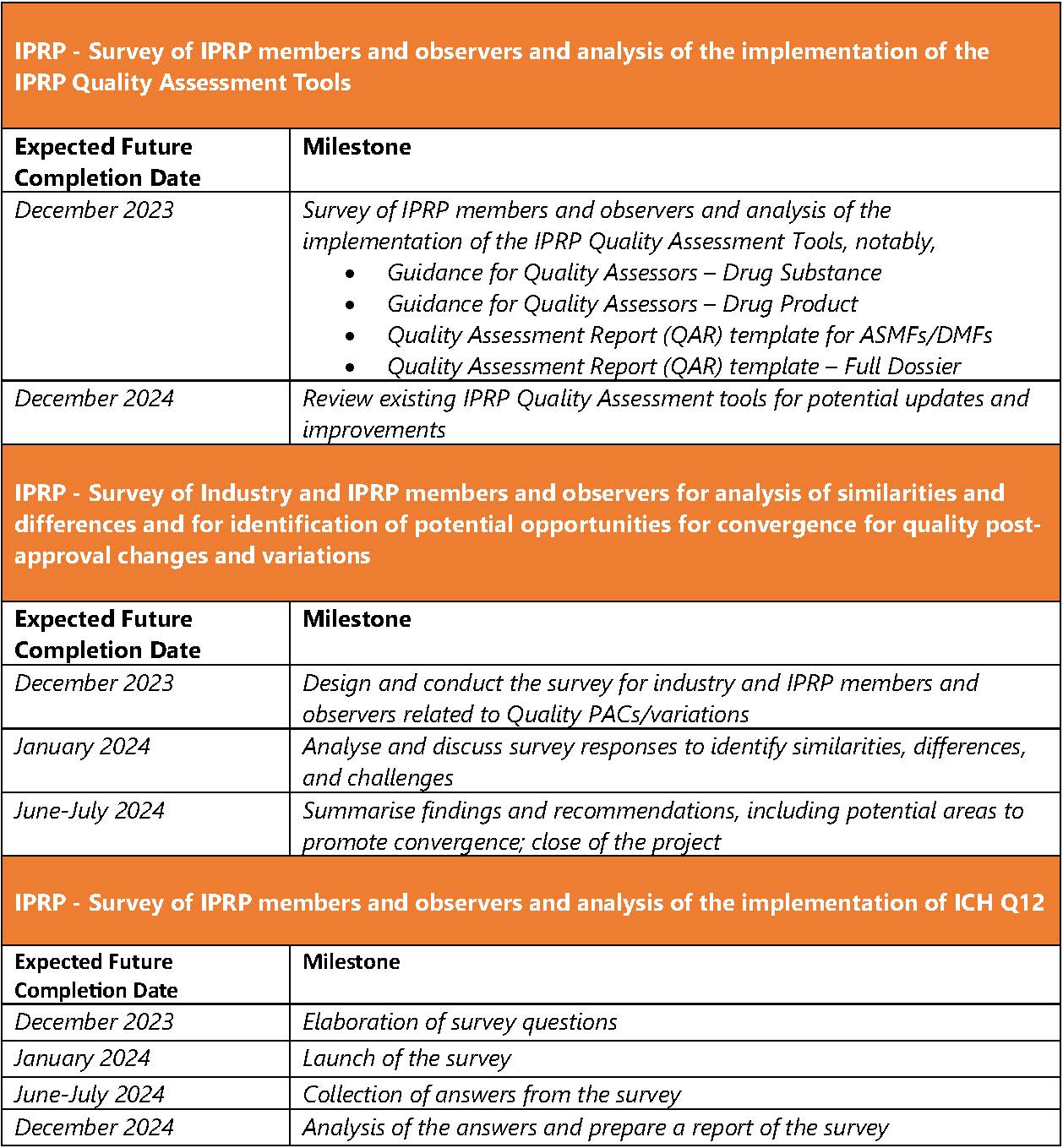
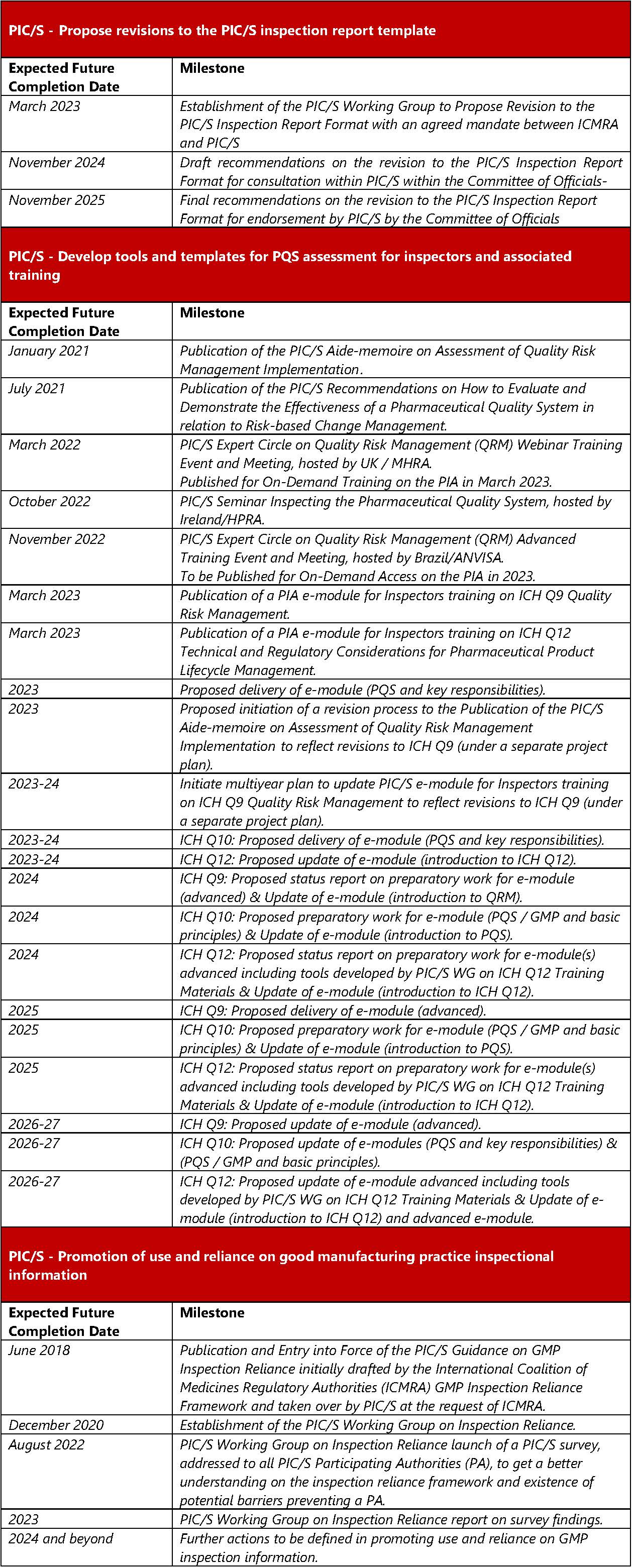
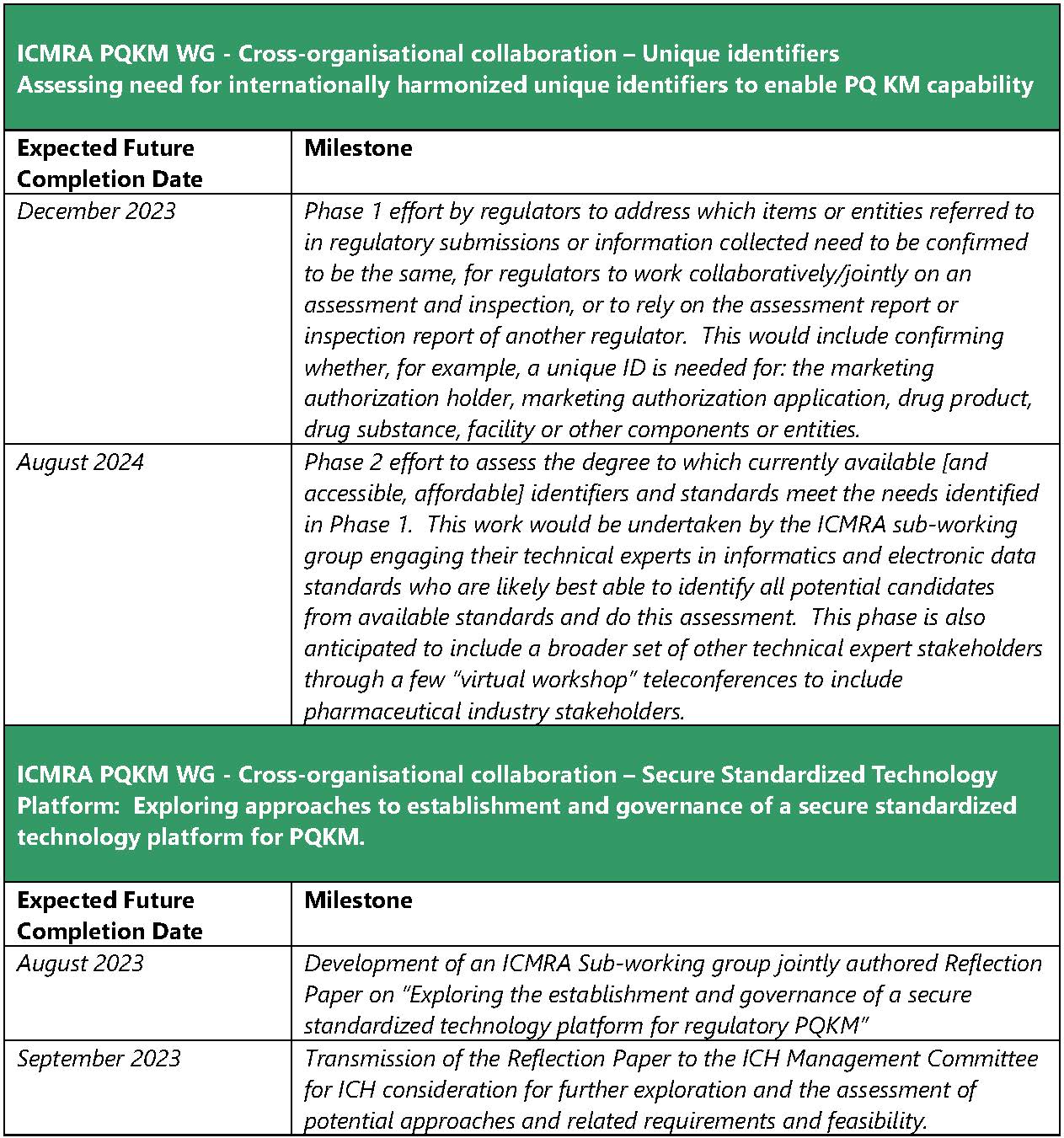
Next steps
This ICMRA-ICH-IPRP-PIC/S work plan reflects current plans and timeframes anticipated for these tasks by the respective organizations to advance the development of the envisioned PQKM capability. It may be noted that the identified tasks and estimated timelines are subject to change as the work evolves and additional contributory efforts may be identified. Going forward the ICMRA PQKM Working Group will update this work plan document as needed.
